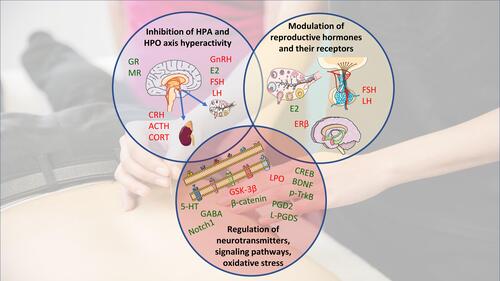Figures & data
Table 1 Common TCM Syndrome Patterns of PMI and PMD
Table 2 Summary of Clinical Trials Investigating the Effects and Safety of Acupuncture on PMI and PMD
Table 3 Results of Meta-Analyses for Existing RCTs
Table 4 Common Defects of Study Design and Reporting Quality Among Current RCTs
Table 5 Summary of Animal Studies Determining the Mechanisms Underlying Acupuncture on PMI and PMD
Figure 1 Potential mechanisms by which acupuncture may improve perimenopausal depression and insomnia. Manual- and/or electro-acupuncture may alter hypothalamic-pituitary-adrenal and -ovarian hyperactivity; modulate reproductive hormones and their receptors, or regulate neurotransmitters, signaling pathways, and oxidative stress. Green indicates an upregulation/increase by acupuncture (↑); red indicates a downregulation/decrease (↓). Acupuncture may also improve perimenopausal depression and insomnia by improving vasomotor symptoms, while this indirect effect is not shown. Images are adapted from Servier Medical Art under Creative Commons CC-BY license.

